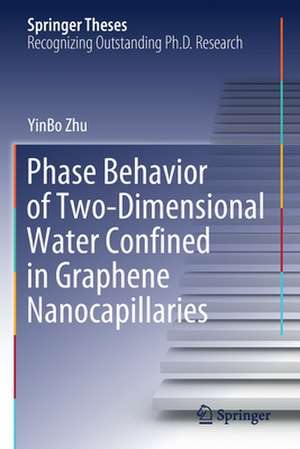Phase Behavior of Two-Dimensional Water Confined in Graphene Nanocapillaries: Springer Theses
Autor YinBo Zhuen Limba Engleză Paperback – 9 oct 2021
| Toate formatele și edițiile | Preț | Express |
|---|---|---|
| Paperback (1) | 689.14 lei 6-8 săpt. | |
| Springer Nature Singapore – 9 oct 2021 | 689.14 lei 6-8 săpt. | |
| Hardback (1) | 942.94 lei 6-8 săpt. | |
| Springer Nature Singapore – 8 oct 2020 | 942.94 lei 6-8 săpt. |
Din seria Springer Theses
- 18%
 Preț: 997.88 lei
Preț: 997.88 lei -
 Preț: 389.88 lei
Preț: 389.88 lei - 15%
 Preț: 646.94 lei
Preț: 646.94 lei - 18%
 Preț: 943.43 lei
Preț: 943.43 lei -
 Preț: 399.29 lei
Preț: 399.29 lei - 18%
 Preț: 944.99 lei
Preț: 944.99 lei - 15%
 Preț: 636.80 lei
Preț: 636.80 lei - 18%
 Preț: 941.05 lei
Preț: 941.05 lei - 15%
 Preț: 643.16 lei
Preț: 643.16 lei - 15%
 Preț: 642.68 lei
Preț: 642.68 lei - 18%
 Preț: 1103.62 lei
Preț: 1103.62 lei - 20%
 Preț: 558.83 lei
Preț: 558.83 lei - 18%
 Preț: 1112.30 lei
Preț: 1112.30 lei - 18%
 Preț: 944.19 lei
Preț: 944.19 lei - 18%
 Preț: 1109.92 lei
Preț: 1109.92 lei - 18%
 Preț: 1217.27 lei
Preț: 1217.27 lei - 15%
 Preț: 640.06 lei
Preț: 640.06 lei - 15%
 Preț: 636.45 lei
Preț: 636.45 lei - 15%
 Preț: 640.06 lei
Preț: 640.06 lei - 15%
 Preț: 640.88 lei
Preț: 640.88 lei -
 Preț: 389.70 lei
Preț: 389.70 lei - 20%
 Preț: 563.91 lei
Preț: 563.91 lei -
 Preț: 393.35 lei
Preț: 393.35 lei - 15%
 Preț: 637.93 lei
Preț: 637.93 lei - 15%
 Preț: 641.85 lei
Preț: 641.85 lei - 18%
 Preț: 1225.94 lei
Preț: 1225.94 lei - 20%
 Preț: 551.36 lei
Preț: 551.36 lei - 18%
 Preț: 1229.10 lei
Preț: 1229.10 lei - 15%
 Preț: 639.25 lei
Preț: 639.25 lei - 18%
 Preț: 999.45 lei
Preț: 999.45 lei - 15%
 Preț: 640.06 lei
Preț: 640.06 lei - 18%
 Preț: 1220.45 lei
Preț: 1220.45 lei - 18%
 Preț: 1116.26 lei
Preț: 1116.26 lei - 18%
 Preț: 1110.72 lei
Preț: 1110.72 lei - 18%
 Preț: 1000.87 lei
Preț: 1000.87 lei - 18%
 Preț: 891.17 lei
Preț: 891.17 lei - 15%
 Preț: 640.06 lei
Preț: 640.06 lei - 5%
 Preț: 1154.07 lei
Preț: 1154.07 lei - 15%
 Preț: 635.96 lei
Preț: 635.96 lei - 15%
 Preț: 640.88 lei
Preț: 640.88 lei -
 Preț: 387.20 lei
Preț: 387.20 lei - 18%
 Preț: 1109.92 lei
Preț: 1109.92 lei -
 Preț: 385.25 lei
Preț: 385.25 lei -
 Preț: 385.25 lei
Preț: 385.25 lei - 18%
 Preț: 1112.30 lei
Preț: 1112.30 lei - 18%
 Preț: 999.45 lei
Preț: 999.45 lei -
 Preț: 386.99 lei
Preț: 386.99 lei - 15%
 Preț: 637.13 lei
Preț: 637.13 lei - 20%
 Preț: 554.21 lei
Preț: 554.21 lei - 20%
 Preț: 555.59 lei
Preț: 555.59 lei
Preț: 689.14 lei
Preț vechi: 810.75 lei
-15% Nou
Puncte Express: 1034
Preț estimativ în valută:
131.86€ • 137.69$ • 108.89£
131.86€ • 137.69$ • 108.89£
Carte tipărită la comandă
Livrare economică 16-30 aprilie
Preluare comenzi: 021 569.72.76
Specificații
ISBN-13: 9789811579592
ISBN-10: 9811579598
Ilustrații: XVII, 118 p. 77 illus., 76 illus. in color.
Dimensiuni: 155 x 235 mm
Greutate: 0.2 kg
Ediția:1st ed. 2020
Editura: Springer Nature Singapore
Colecția Springer
Seria Springer Theses
Locul publicării:Singapore, Singapore
ISBN-10: 9811579598
Ilustrații: XVII, 118 p. 77 illus., 76 illus. in color.
Dimensiuni: 155 x 235 mm
Greutate: 0.2 kg
Ediția:1st ed. 2020
Editura: Springer Nature Singapore
Colecția Springer
Seria Springer Theses
Locul publicării:Singapore, Singapore
Cuprins
Introduction.- Monolayer square-like ice between two graphene sheets.- Superheating of monolayer ice in graphene nanocapillaries.- AB-stacking bilayer square-like ice in graphene nanocapillaries.- AA-stacking bilayer ice in graphene nanocapillaries.- Trilayer ice in graphene nanocapillaries.- Compression limit of 2D water confined in graphene nanocapillaries.- Summary and future work.- Appendix A: Mechanical design on graphene-based materials.
Notă biografică
Dr. YinBo Zhu is an Associate Research Fellow at the University of Science and Technology of China. His research activities chiefly focus on the mechanical behavior and design of micro- and nanostructural materials, two-dimensional water, and mass transfer under nano-confinement.
Dr. Zhu completed his B.S. in Engineering Mechanics at North China University of Water Resources and Electric Power in 2013, and completed his Ph.D. (advisor: Prof. HengAn Wu) in Solid Mechanics at the Department of Modern Mechanics, University of Science and Technology of China, in 2017.
He was subsequently a Postdoctoral Fellow (under the supervision of Prof. HengAn Wu) at the Department of Modern Mechanics, University of Science and Technology of China, from 2017 to 2019, prior to assuming his current position.
Textul de pe ultima copertă
In this book, the authors use molecular dynamics simulations to conduct a comprehensive study of the compression/superheating limit and phase transition of 2D (monolayer, bilayer, and trilayer) water/ice constrained in graphene nanocapillaries. When subjected to nanoscale confinement and under ultrahigh pressure, water and ice behave quite differently than their bulk counterparts, partly because the van der Waals pressure can spark a water-to-ice transformation, known as the metastability limit of two-dimensional (2D) liquids. From a mechanical standpoint, this liquid-to-solid transformation characterizes the compression limit (or metastability limit) of 2D water. The findings presented here could help us to better understand the phase behavior of 2D confined water/ice.
Caracteristici
Nominated as an outstanding Ph.D. thesis by the University of Science and Technology of China Presents a comprehensive study on the compression/superheating limit and phase transition of 2D water/ice constrained in graphene nanocapillaries Shares findings that could help us to better understand the phase behavior of 2D confined water/ice
